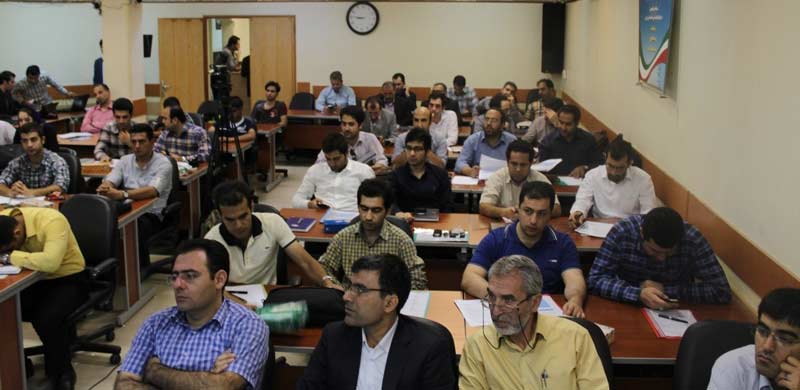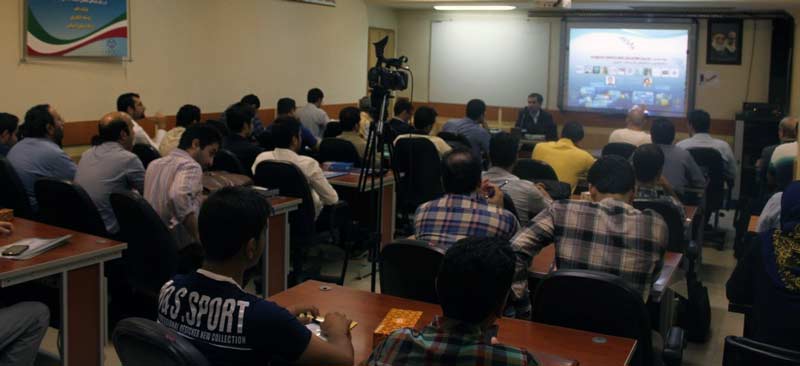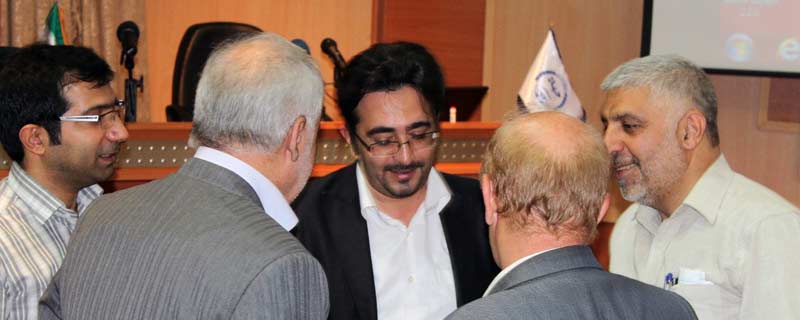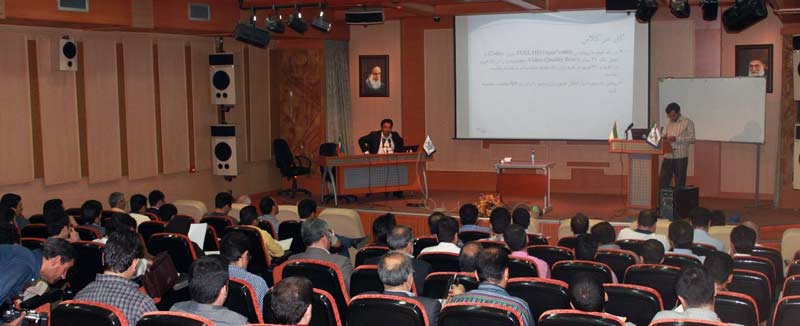For the first time in Iran a seminar on Fundamentals of advanced intelligent video surveillance solutions were held with domestic participants
Sharif Academic Center for Education, Culture and Research (SACECR) hosted more than ninety experts and activists in the video surveillance industry of IRAN. These experts were participated in special course on intelligent video surveillance. This course was held by Prof. Mohammad Ghalamchi, head of Electronic Security Standards of Iran who is the designer of first Iranian standard video surveillance software. The course held in contribution with GMTII (Ghalamchi Management and Technology Improvement Institute) and SACECR. The GMTII done the scientific part and SACECR was the event holder.

The first notable point in this special seminar was the widespread attention and participation of audience. Some activists of video surveillance industry were already informed by the outline of course content. High level of specialized content has created the impression that up to fifty people attend this courses but the event holder faced ninety participants in the first day of seminar which exceeds the capacity of the auditorium. This broad participation led to change in seminar venue from conference hall to another auditorium with more capacity. This surprising participation continued to the end of second day of seminar and despite the cancellation of roll call due to high statue of audience, they enthusiastically participated in all sessions.

The seminar started by a lecture by Passive Defense Studies Center chairman who was the presenter of the course. While welcomed the participant, Mr. Abedi gave a description of Passive Defense Studies Center of SACECR and course content then invited the main instructor of course to present his lecture.
Multiplicity of participants and SACECR sensitivity to confirm their identity and documents caused the seminar to hold 30 minutes later than the schedule. The course was held in auditorium from 9.00 to 10.30 am. The first part of the seminar started with presentation of two parts out of nineteen course syllabus. On one hand, lack of space to host some of the participant and on the other hand inefficiency of ventilation due to multiplicity of participants caused the organizers of seminar to change the conference venue to SACECR conference hall in first break. This change satisfied the participants.
After this change and in second halftime scheduled content were presented by Prof. Ghalamchi. Then, participants were guided for pray and lunch.

Presentation continued on 2.00 PM according to announced schedule. Lunch time gave the participants an opportunity to discuss with the instructor of the course and his colleagues. In the meantime some questions about course content were asked by participants which were answered by instructor and in some cases by other participants. These questions were mostly related to problems and concerns of participants and users with video surveillance systems especially software part in these systems. Such problems were numerous.

The schedule of second day of seminar was similar to first day and it started with Prof. Ghalamchi lecture then it followed by video surveillance system hack and practical presentation of analytic (picture processing) assisted by experts from GMTII. These programs were welcomed by the participants. In the afternoon of second day, participants filled questionnaires provided by GMTII and SACECR during the course.
According to the survey, the participants in the training course, which were among experts and senior experts of protection and security in big service providers of public and private sectors, believed in the importance of the course and asked for the continuation of such special and knowledge-based seminars.
In the last hours of the seminar, participants were tested and the results were handed to event holder for the issuance of certificates.
After the course, those participants who were eager to get familiar with GMTII video surveillance products and domestic standard analytic (made in IR-IRAN) remained in the hall to visit Amnpaayesh (Video Surveillance comprehensive software) Farja (Number plate Recognition and parking automation software) and Rokhpaayesh (specialized face recognition software). Software quality and their diverse functions fascinated participants.
19 topics in this course were presented as follows:
1. History of recording and management in video surveillance systems and evaluation of capabilities for each system.
2. Threats of hacking and video surveillance intrusion along with prevention and immunization methods
3. General functions of comprehensive video surveillance software
4. Definition of video streaming, streaming technologies, and characteristics of each technology.
5. Methods of analog cameras installation and SDI to Amnpaayesh
6. Methods to find image streaming settings in new cameras (video stream reverse engineering)
7. Multicasting; opportunities, threats and the origin of this technology
8. Restreaming; Concepts, meaning and functions
9. Standard security features required by video surveillance management systems
10. Streaming and video recording codecs; opportunities and threats
11. Mechanisms of resource sharing, Cloud Computing، Green Computing and Redundancy solutions
12. Integration of widespread video surveillance systems in large geographic areas (Federation)
13. Examples of intelligent analytic of images and their applications
14. Opportunities and threats in Plate recognition and face recognition analytics
15. Methodologies to reduce video transmission bandwidth
16. National and international standards, International and domestic certificates for video surveillance software
17. Comparison of top video surveillance software capabilities (evaluation of Milestone, Genetec Omni cast, Amnpaayesh, Axxon, NUUO, Symphony, See Tec)
18. Hardware (Server specification) required by video surveillance software
19. Introduction to Iranian standard Video Surveillance Software.
Persistent presence of participants indicated success of the course. Colonel Sadeghi (head of Traffic Police ICT Department), Mr. Khatibzadeh (Deputy Director General of Electronic Security System Development Department, Ministry of Petroleum) were among prominent participants of this seminar. Following diagrams present more details of the course participants:

Participants of this special course received a certificate. This was an initial course on video surveillance software using producer knowledge. Other special courses of video surveillance including practical course of video surveillance software and the review of technological parameters of CCTVs is going to be held in future.



